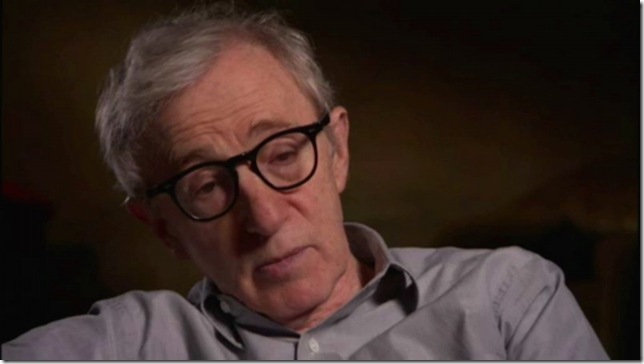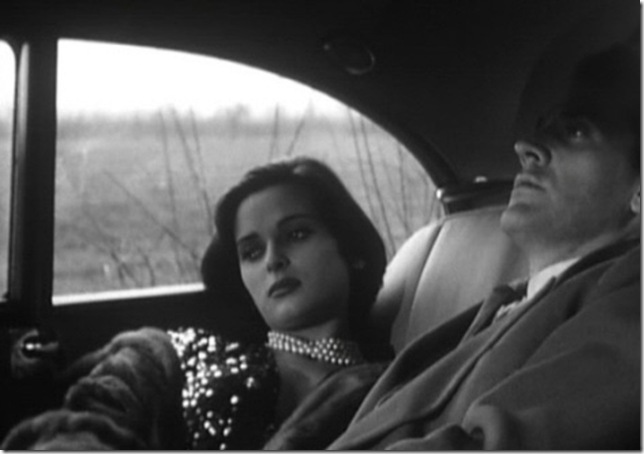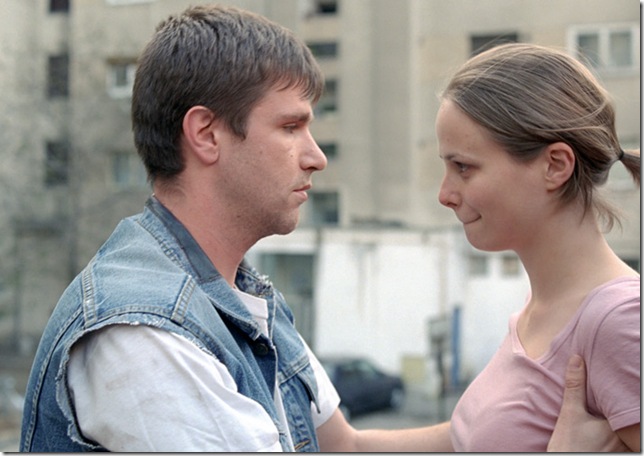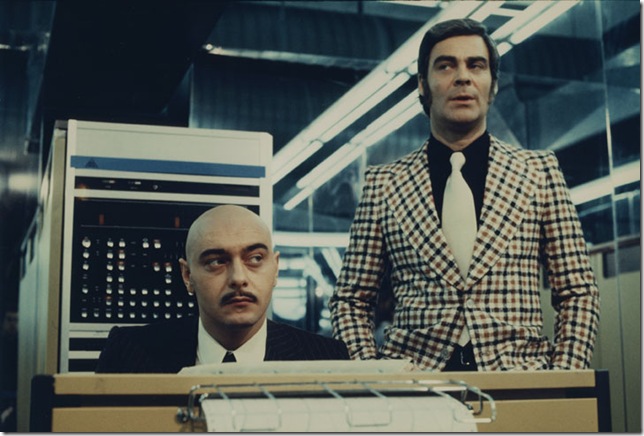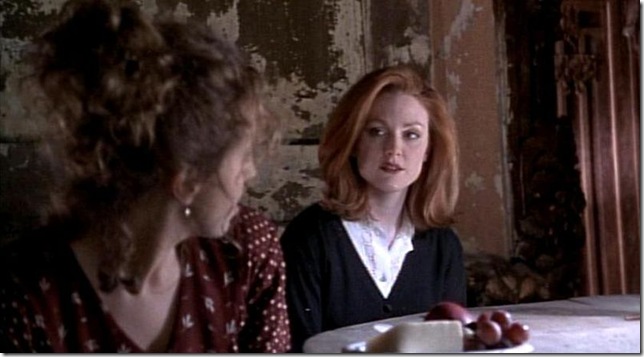There are many, many people who would disagree with me (I’m marrying one of them), but I can think of no better way to spend 195 minutes than watching a documentary on Woody Allen.
I’m what you might call a Woody Allen fanboy – an apologist, even. I will go on record appreciating his bombs as well as his critical successes (well, most of them, anyway – Cassandra’s Dream and Scoop are tough sells even for me). The opening of a Woody Allen movie remains, for me, an annual event I anticipate like Christmas or New Year’s.
Curb Your Enthusiasm director Robert B. Weide shares a similar affection for Allen’s work, which comes across in his mammoth Woody Allen: A Documentary (Docurama, $21.99), originally broadcast as part of PBS’ American Masters series. Weide interviews Allen extensively, as well his casting director, producers and numerous actors, from Louise Lasser to Scarlett Johansson.
Presenting Allen’s life and work in a rough chronology with a few thematic detours, Woody Allen: A Documentary is a trove of fascinating information. We learn, for instance, that ideas come to Allen constantly, and he scribbles them on scraps of looseleaf paper shelved wantonly in his nightstand. He still writes everything on the German typewriter he’s been using for decades. And when he desires a particular actor for a role, he sends him or her a personalized letter.
During the shoot, he encourages his cast members to “change whatever words you like” from the script, so long as the meaning stays intact. When forced to choose, he would give up movie-watching for the rest of his life to continue to watch sports.
For a director with 47 titles to his credit, it’s inevitable that some of them will get short shrift. But there’s a commendable balance to Weide’s sprawl; none of Allen’s groundbreaking works are ignored. The early ‘90s marital scandal is addressed, but not in a revelatory way. Mia Farrow and Soon-Yi Previn declined to be interviewed, understandably.
What’s especially great about the two-part, two-disc series, which aired this past November, is that it has a ripped-from-the-headlines quality. There is plenty of material on Midnight in Paris, including the news that it has become Allen’s highest-grossing film of all time.
But most of the filming of Woody Allen: A Documentary took place during the production of You Will Meet a Tall Dark Stranger, a pretty good movie that hardly anyone saw. With Midnight only a twinkle in the future (I believe it was “Untitled Woody Allen Project” for a while), Allen speaks of feeling “screwed,” telling Weide, “I don’t care about commercial success, and as a result I rarely achieve it.” He comes off as pessimistic about what he sees as the pointless marketing rigors of his movies, from red-carpet interviews to panel discussions, and there’s a self-sacrificial world-weariness to his tones that suggest a career of continued shots in the commercial dark. On Everyone Says I Love You, he recalls, “I did it, like most of my films, for the few people that like it.”
With this barrage of self-deprecation behind him, one couldn’t have scripted a more pleasantly ironic counterpoint than Midnight in Paris. Allen, however, doubtlessly hates the sentimentality of ending this documentary on roses and sunshine. Throughout the film he comes across as a wannabe tragedian – the American Bergman – in the guise of a self-loathing clown, wishing that he had excised the comic plot of Crimes and Misdemeanors or any of the upbeat passages in Hannah & Her Sisters.
What began as a memorable sequence in Stardust Memories – Allen’s character insisting to aliens that he must express the world’s suffering in his films – has since become his desired, if unattainable goal, and it has soured him on even some of his best movies (he doesn’t even like Manhattan), blinding him to his own comic genius. And that is a tragedy.
DVD Watch
Feb. 7: The title sounds like Lifetime Network schmaltz, but Story of a Love Affair (Lorber, $19.99) is actually the first film from Italian auteur Michelangelo Antonioni, released in 1950. Antonioni had yet to develop his signature meandering, nonlinear style, but Story is a tight neo-realist drama whose long-held camera positions recall the rigor of Carl Dreyer more than any other postwar Italian director. This edition replaces the out-of-print release by NoShame Films, and a bonus disc includes the feature-length documentary Identification of a Masterpiece, the 29-minute doc Story of a Peculiar Night and two bite-sized featurettes.
Today also marks the release of Criterion’s highly anticipated packaging of two films by experimental director Chris Marker. The La Jetée/Sans Soleil pack ($27.99 Blu-ray, $24.99 DVD) marks the first time the free-form travelogue Sans Soleil has been released in America since VHS. La Jetée is a film told entirely with still photographs, and its ambitious science-fiction story inspired Terry Gilliam’s 12 Monkeys and David Bowie’s “Jump They Say” music video. Supplements include a video piece by Marker, a video interview with filmmaker Jean-Pierre Gorin, and an analysis of Hitchcock’s Vertigo and its influences on Marker. Elsewhere, Stephen Frears’ Dangerous Liaisons makes its Blu-ray debut (Warner, $15.99).
Feb. 14:The Romanian New Wave is continuing to thrive – even if North American audiences don’t get to experience it very often in theaters. Today, Zeitgeist Video is offering two recent Romanian art-house hits. The 2011 theatrical release Tales From the Golden Age ($26.99) is an omnibus film conceived by Cristian Mungiu (director of the masterpiece 4 Months, 3 Weeks and 2 Days). He and five colleagues explore several of their nation’s urban legends to paint a funny and surreal portrait of life under the Ceaucescu dictatorship in the 1980s. Summer Holiday ($29.99), directed by Radu Muntean, is a humanist dramedy about relationships and mid-life crises set during an idyllic seaside vacation.
Also, you can celebrate Valentine’s Day with Jerry Lewis in hi-def; today is the first time the funnyman has seen a Blu-ray treatment, thanks to Olive Films. The three classic Lewis titles on tap are Boeing Boeing, The Geisha Boy and Rock-a-Bye Baby ($21.99), the latter two directed by the great Frank Tashlin. On the newer front, don’t miss Take Shelter ($28.99 DVD, $24.99 Blu-ray), the 2011 critically acclaimed drama about rural paranoia starring the brilliant Michael Shannon and the ubiquitous Jessica Chastain.
Feb. 21: The big draw this week is 1973’s World on a Wire (Criterion, $27.99 Blu-ray, $19.99 DVD), all 212 minutes of it, fresh off its theatrical reissue. The futuristic tale centers on a “cybernetics engineer who uncovers a massive corporate conspiracy,” and it showcases enfant terrible Rainer Werner Fassbinder at his most radical, inspired in patches by Stanley Kubrick, Kurt Vonnegut and Philip K. Dick. This one is worth canceling plans for and sinking into your sofa for three and a half hours. Bonus features include a 50-minute documentary on the making of the film.
Two classics also receive Blu-ray releases today: Otto Preminger’s courtroom masterpiece Anatomy of a Murder (Criterion, $27.99) and John Ford’s Civil War film Fort Apache (Warner, $13.99). I also recommend last year’s moving drama about cult life Martha Marcy May Marlene (Fox, $19.99 Blu-ray, $15.99 DVD), though I’m apparently the only one.
Feb. 28: Kino offers two reissues by the great Fritz Lang: Spiders ($24.99), the two-part, silent adventure epic that put him on the map; and the Blu-ray premiere of Scarlet Street ($19.99), one of the most emotionally devastating and coolly calculated noirs ever made, with milquetoast artist Edward G. Robinson lured into corruption by a manipulative broad. Elsewhere, Criterion reissues the long-out-of-print Vanya on 42nd Street ($27.99 Blu-ray, $19.99 DVD), a behind-the-scenes, street-clothes take on Chekhov’s Uncle Vanya as interpreted by David Mamet and Louis Malle.
TCM Watch: Every February, TCM presents a full month of Oscar-winning films, and this year they are repackaged in a fun way. Each day, the network journeys to a different geographical era, presenting a lineup of award-winners that are set, or shot, in that region. For instance, the Wyoming-set night of Feb. 10 includes screenings of Close Encounters of the Third Kind (8 p.m.), Cat Ballou (1:15 a.m.) and Portrait of Jennie (3 a.m.). Some of the regional connections – it’s not often you’ll see Flying Down to Rio and Kiss of the Spider Woman screened on the same night, as they are on a Feb. 21 trip to South America – but the Oscar theme doesn’t allow for too many rare or unusual titles this month.
